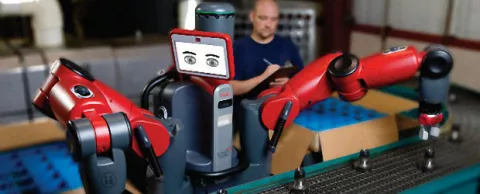
New "collaborative" robots are taking work away from humans, as you'll read below. Unless you want to see your city's unemployment rate rise, you'll want to take steps to stem the tide. Especially since the best fight-back tactic is something you need to do anyway — namely, retrain your workforce to do "smart" jobs instead of manual labor.
Want specific suggestions? Follow the links below that explain how Huntsville managed to build the country's second-largest tech workforce. And when I say "tech" I'm really saying "well-paid." You know this trend is inevitable. So why not start in earnest now, while you can still gain an advantage over cities that are slow to start retraining? — Jesse Berst
The workforce as we know it may not exist for much longer. Your co-workers may soon be robots.
Council Lead Partner Cisco wrote a feature story about the future of manual labor and it finds the mechanical workers — or co-bots — are already taking more jobs. On one hand, you won’t be pestered to buy chocolate bars to send your co-bot’s kids to band camp. On the other, the trend is forcing cities to take action today to make sure that their humans are still gainfully employed.
From co-worker to co-bot
Once relegated to specific tasks on an assembly line, Cisco finds that the new robots are more like true co-workers. Reduced size has allowed them to move out of dedicated spaces. High-resolution sensors and safety features allow them to work essentially side-by-side with people.
In fact, the “co” in “co-bot” stands for collaborative. The report finds that in more cases, humans and robots are working together. One automaker has people and robots working on the same part at the same time. Humans put the wiring in the door while robots install the window.
Advances in technology are giving robots hands that are more like humans. One company is building robots that can sew using conventional sewing machines.
Keeping humans employed
As robots are capable of doing more of jobs that used to require a human touch, the question becomes what will people do? The report finds there will still be jobs, but they will be different jobs.
There will be “fewer dirty jobs and more smart jobs,” Henrik Christensen, chair of Robotics at Georgia Institute of Technology and executive director of the Institute for Robotics and Intelligent Machines tells Cisco.
Robot repair seems like one high-growth field, but even it may not be a good long-term career choice. Cisco finds some robots are already taking supervisor jobs; they are monitoring and supervising other robots.
If you want to keep people employed, you need a workforce that understands business and technology, and can use creativity to find and capitalize on opportunities. That’s not a workforce you can build overnight.
Lessons from Huntsville
If you were to make a list of the American cities with the largest technology workforces, would Huntsville, Alabama, make your list? In a measure that compares a city’s tech jobs to its overall workforce, Huntsville has the second-largest tech workforce in the country. It even ranks ahead of the greater Seattle area, which is home to high-tech companies like Amazon and Microsoft. (California’s Silicon Valley ranked first.)
Huntsville’s success was no accident. The city established the Huntsville Center for Technology, allowing high school students to get technical training through hands-on experience, internships, apprenticeships and cooperative education.
It’s also on its way to becoming a gigabit city. Nine companies submitted bids to help the city roll-out a high-speed Internet infrastructure.
“Internet connectivity will be as important as any other utility component of our infrastructure investment,” Mayor Tommy Battle said during his State of the City Address.
At a time when robots are threatening to take more jobs, Huntsville’s job market is growing. The aerospace and defense company Northrop Grumman recently announced it was expanding its full-time technical workforce in the city, creating a variety of new positions that range from engineers and analysts to administrators and managers.
More stories …
New high-tech jobs initiative: What’s good for the workforce is good for cities
Top cities for attracting tech talent? Maybe not where you think
Pending retirements force LA to rethink how to fill its tech jobs



